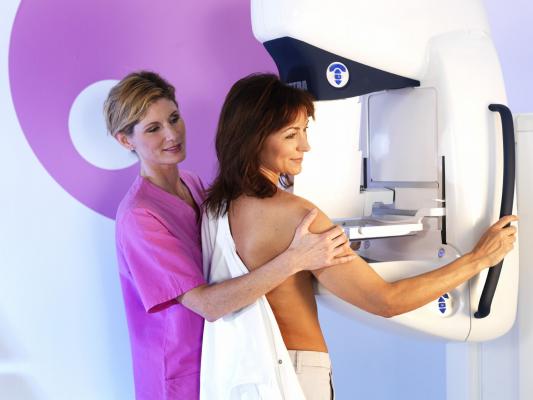
January 19, 2017 — Breast cancer screening in Denmark was associated with a substantial increase in the incidence of nonadvanced tumors and ductal carcinoma in situ (DCIS) but not with a reduction in the incidence of advanced tumors. The rate of overdiagnosis was also substantial. The findings of a cohort study are published in Annals of Internal Medicine.
Effective breast cancer screening should detect early-stage cancer and prevent advanced disease. Overdiagnosis occurs when mammography detects small tumors that may never affect the patient's health during a lifetime. The problem with overdiagnosis is that it exposes patients to the potential harms of treatment, such as surgery, chemotherapy and radiation, without a clinical benefit. Whether screening reduces the incidence of advanced tumors has important treatment implications.
Using data from two comprehensive Danish cancer registries, researchers sought to examine the association of screening with a reduction in the incidence of advanced cancer and estimate the level of overdiagnosis in the country's breast screening program. Denmark’s breast screening program offered biennial mammography for women aged 50 - 69 years beginning in different regions at different times. The authors measured the incidence of advanced and nonadvanced breast cancer tumors in screened and unscreened women. To examine trends in overdiagnosis, the authors compared the incidence of advanced tumors in women aged 50 to 84 in screening and nonscreening areas and compared the incidence for nonadvanced tumors among women aged 35 to 49, 50 to 69, and 70 to 84 years in both screening and nonscreening areas. They concluded that screening was not associated with lower incidence of advanced tumors and approximately 1 in 3 invasive tumors and cases of DCIS diagnosed in screened women represent overdiagnosis.
In an accompanying editorial, Otis Brawley, M.D., MACP, chief medical officer of the American Cancer Society, said that it's time to accept that overdiagnosis is real and that the benefits of breast screening have been overstated. He writes that "considering all small breast cancer lesions to be deadly aggressive cancer is the pathology equivalent of racial profiling." This does not mean that screening should be abandoned, but we should try to recognize its limitations, use it in the most effective way possible, and try to improve it. Brawley suggested that more emphasis should be focused on preventing breast cancer through diet, weight control and exercise.
For more information: www.annals.org
References
Jorgensen, K.J., Gotzsche, P.C., Kalager, M., Zahl, P-H. "Breast Cancer Screening in Denmark: A Cohort Study of Tumor Size and Overdiagnosis." Annals of Internal Medicine. Published online Jan. 10, 2017. DOI: 10.7326/M16-0270


 February 18, 2026
February 18, 2026 









